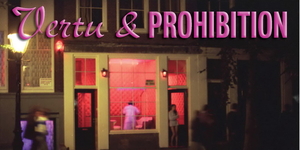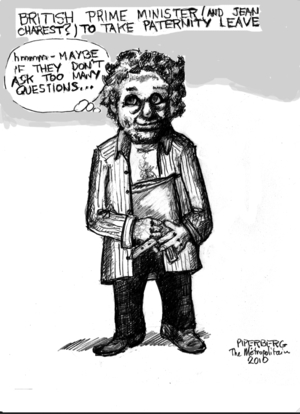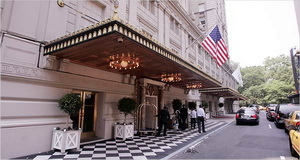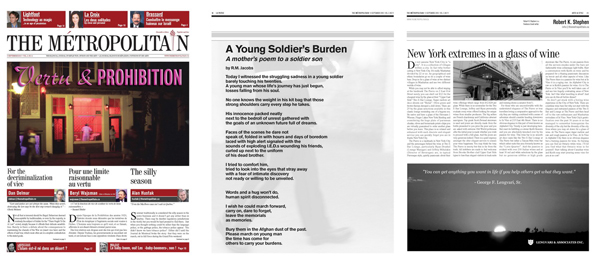Le baby-boom, oui! Les «baby-boomers», non!
Par Pierre K. Malouf le 9 septembre 2010
Dans un article publié récemment, j’écrivais que les «baby-boomers» n’avaient pas participé à la Révolution tranquille, que les plus âgés d’entre eux, qui en 1960 venaient à peine de dépasser l’âge de la puberté, n’en avaient été que d’innocents témoins, que les plus jeunes n’étaient pas encore nés. Je vais y aller aujourd’hui d’affirmations plus choquantes encore, ce qui me vaudra, je l’espère, le privilège d’être condamné par ceux qui croient encore à l’existence de ce personnage mythique, le «baby-boomer».
Mathématiques répugnantes: Combattre le mensonge haineux et la désinformation venimeuse sur Israël et le peuple juif
Par Jacques Brassard le 9 septembre 2010
Gérald Larose est un personnage public bien connu. Il fut longtemps président de la CSN, la centrale syndicale la plus gauchiste de toutes. Il est depuis quelques années à la tête du Conseil pour la Souveraineté. Je l’ai connu et côtoyé lors des travaux de la Commission Bélanger-Campeau sur l’avenir du Québec, étant tous deux membres de cette instance. C’était une personne plutôt sympathique dans les relations interpersonnelles, mais il portait et il porte toujours la lourde défroque idéologique de la gauche.
For the decriminalization of vice
Par Dan Delmar le 9 septembre 2010
 Not all that is immoral should be illegal. Behaviour deemed unacceptable by traditionalists, or even by the majority, is routinely the subject of fodder for the “There Ought To Be A Law” crowd, simply because it offends their delicate sensibilities. Rarely is there a debate about the consequences to maintaining the charade of the War on (insert vice here) and the effects of said war, which most often are in complete contradiction to the stated goals.
Not all that is immoral should be illegal. Behaviour deemed unacceptable by traditionalists, or even by the majority, is routinely the subject of fodder for the “There Ought To Be A Law” crowd, simply because it offends their delicate sensibilities. Rarely is there a debate about the consequences to maintaining the charade of the War on (insert vice here) and the effects of said war, which most often are in complete contradiction to the stated goals.
The silly season
Par Alan Hustak le 9 septembre 2010
 Summer traditionally is considered the silly season in the news business and it doesn’t get any sillier than in Quebec. There may be dumber regulatory jurisdictions in the world, but you would be hard pressed to find them. Just when you thought nothing could be sillier than the language police, or the garbage police, the tobacco police appear. You didn’t know we have tobacco police? Either did I until the Journal de Montreal broke the story that they were on the march, out in full force during the Grand Prix weekend.
Summer traditionally is considered the silly season in the news business and it doesn’t get any sillier than in Quebec. There may be dumber regulatory jurisdictions in the world, but you would be hard pressed to find them. Just when you thought nothing could be sillier than the language police, or the garbage police, the tobacco police appear. You didn’t know we have tobacco police? Either did I until the Journal de Montreal broke the story that they were on the march, out in full force during the Grand Prix weekend.
New Brunswick’s brewing language war
Par Graeme Decarie le 9 septembre 2010
Moncton, New Brunswick - There is a flag flying at house down the street from my home in Moncton, New Brunswick. At first, I took its red, diagonal cross on a white background as theold flag of St. Patrick. But a closer look showed a red and white maple leaf at the centre; and I don't think St. Pat was ever big on maple leaves No, this was the official flag of Anglophone New Brunswick.
And I think New Brunswickers, both Francophone and Anglophone, are being conned into a war that can only hurt all of them.
Pour une limite raisonnable au vertu
Par Beryl Wajsman le 9 septembre 2010
Depuis l'époque de la Prohibition des années 1920, l'histoire récente nous démontre que les tentatives de l'État de s'employer à l'ingénierie sociale sont vouées à l'échec. L'homme aura toujours ce qu'il veut; et ce faisant, affermira le soi-disant élément criminel parmi nous.
Des lois relatives aux drogues sont des lois qui n'ont pas lieu d'exister. Depuis Trudeau, les gouvernements se succédant ont tenté, et ont échoué face à une opposition virulente d'une droite rétrograde, de les radier des livres. Jusqu'à présent, les lois régissant les armes à feu auront coûté plus d'un milliard de dollars, sans commission d'enquête, et sont futiles puisque les criminels ne déclarent pas leurs armes. Faut-il une ruade pour que nos législateurs comprennent une réalité pourtant bien simple?
Harsh justice for whom?
Par Alan Hustak le 9 septembre 2010
There are bleeding-heart liberals who are said to be soft on crime and then there are the hardliners who would have us believe that, despite all evidence pointing to the contrary, crime is on the rise in Canada and the only fix is to lock up more Canadians.
About 120 out of every 100,000 Canadians, about 14,000 inmates, are doing time in Canada’s 58 federal prisons. The Harper administration now proposes to spend $2-billion to incarcerate another 4,000 because, there are supposedly perpetrators guilty of unreported crimes running loose on the streets. While it wants to build more prisons, the government also proposes an equally misguided policy that would close the country’s six prison farms which were designed, in part, to help integrate inmates back into society.
A Young Soldier’s Burden
Par R.M. Jacobs le 9 septembre 2010
A Young Soldier’s Burden
A mother’s poem to a soldier son
While the Arab League Slept: The EU and cooperation
Par Rouba al-Fattal le 9 septembre 2010
There is no denying that the EU lacks a clear strategy when it comes to the Mediterranean in particular and the Arab world in general, as Abdullah Baabood posits. EU’s strategy has indeed oscillated over the past fifteen years between promoting free-trade and democracy multilaterally, to fostering bilateral cooperation with attached conditions, to lifting the conditionality all together and scraping the human rights and democracy questions off its wish-list in what can be described as a series of reactive policies in response to the oil crisis, EU’s own enlargement, and terrorism threats. It is also true that the EU’s policy towards the region was a factor in deepening divisions between the Mediterranean and the Gulf states, and that there is “much to gain by linking the EU’s various policy threads with different Arab countries”, even more in fostering a Euro-Arab agenda instead of the exclusive and divisive EU-Mediterranean vision.
Canadian High Speed Rail: More Promise than Reality?
Par Robert Presser le 9 septembre 2010
 There are two figures readers need to keep in mind as they contemplate the possibility of boarding a 250 km/h train between Montreal and Toronto: 511 and 19. The 511 is the number of kilometers of High Speed Rail (HSR) that Brazil plans to build to link its largest cities, Sao Paulo and Rio de Janeiro via Campinas. The 19 is the number of billions of US dollars this project is likely to cost. The Brazilians deserve a great deal of credit for not hiding the truth from their population as to the cost and complexity of the project. Creating HSR in Brazil is essential to relieving pressure from Brazil’s overcrowded airports and its decaying roads, which are overwhelmed by crowded buses that fight with the truck traffic between the two massive population hubs.
There are two figures readers need to keep in mind as they contemplate the possibility of boarding a 250 km/h train between Montreal and Toronto: 511 and 19. The 511 is the number of kilometers of High Speed Rail (HSR) that Brazil plans to build to link its largest cities, Sao Paulo and Rio de Janeiro via Campinas. The 19 is the number of billions of US dollars this project is likely to cost. The Brazilians deserve a great deal of credit for not hiding the truth from their population as to the cost and complexity of the project. Creating HSR in Brazil is essential to relieving pressure from Brazil’s overcrowded airports and its decaying roads, which are overwhelmed by crowded buses that fight with the truck traffic between the two massive population hubs.
Technology as Magic...in an age of pessimism
Par Steven Lightfoot le 9 septembre 2010
Robert Goddard was a dreamer and inventor. Born in Massachusetts in 1882, he was a sickly child, and fell behind his fellow students. But he had an insatiable curiosity about the physical world and was a voracious reader. He managed to become valedictorian of his high school class, stating in his address, "It has often proved true that the dream of yesterday is the hope of today, and the reality of tomorrow."
Les deux solitudes : Up close and personal
Par Fanny La Croix le 9 septembre 2010
Why do Francophones speak so much English amongst themselves? It’s a question you find yourself asking often when you’re in constant language flux, seamlessly weaving between the two solitudes.
Même parmi les Francophones pures laines, certains dont l'anglais est au mieux passable, ils se retrouvent à utiliser ce langage si confortable et si à la mode, celui de Shakespeare. De temps en temps, il y a un éveil, alimenté par la fierté nationaliste; les excuses commencent ainsi que la détermination bien intentionnée de vouloir parler plus le français, mais c’est de courte durée.
L’Islam est-il né dans un désert?
Par Louise V. Labrecque le 9 septembre 2010
Dans cinq ou huit langues différentes, en fouillant bien, des savants ont trouvés des textes arabiques, qui n’ont aucune parenté avec l’arabe qu’on connait. Le défi, pour quiconque s’intéresse à l’avant-Islam, c’est de trouver des sources. Il faut donc, bien souvent, se tourner vers la tradition orale et de la poésie archaïque, recueillis par les premiers savants arabo-musulmans (des milliers de textes antiques), souvent gravés sur pierre ou métal, espèces de graffitis incisés par des passants sur les roches, le long des chemins et autres documents d’archives écrits sur des bouts de bois, en alphabet cursif. En effet, cette diversité précède la conversion à l’Islam et porte le nom de Jâhiliyya ou « Age de l’ignorance »; en ce temps-là, la Mecque était une petite bourgade aux ressources limitées où la faim et la survie était lot quotidien de la population. Parce qu’elle n’a jamais été réellement conquise, l’Arabie n’est mentionnée qu’incidemment dans les sources orientales (annales syriennes et la Bible).
Piperberg's World
Par Roy Piperberg le 9 septembre 2010

Otto Joachim: A majestic legacy
Par Alan Hustak le 9 septembre 2010
During the First World War Otto Joachim was still a boy taking music lessons at the Buths-Neitzel conservatory. In Dusseldorf each day he passed a house that once belonged to Johannes Brahms. That, he said, gave him an inspiration, if he needed any, to think, “Hey, are you going to be a composer some day?”
New York extremes in a glass of wine
Par Robert K. Stephen le 9 septembre 2010
 Do not assume New York City is “a city”. It is a collection of villages within a city. In fact why bother calling it New York City. It’s really Manhattan divided by 22 or so. As geographical and ethnic boundaries go so do a couple of wine bars. Drop in for a glass of wine at two distinct villages in Manhattan and see two different worlds of wine.
Do not assume New York City is “a city”. It is a collection of villages within a city. In fact why bother calling it New York City. It’s really Manhattan divided by 22 or so. As geographical and ethnic boundaries go so do a couple of wine bars. Drop in for a glass of wine at two distinct villages in Manhattan and see two different worlds of wine.
LA DÉLIVRÉE
Par Louise V. Labrecque le 9 septembre 2010
Enfin! Éva Circé-Côté est sortie des oubliettes pour entrer de plein fouet dans nos esprits, en même temps que sur les tablettes de nos librairies ! Il était temps, en effet, de dépoussiérer l’œuvre extraordinaire de cette grande dame, libre-penseuse, poète, dramaturge, journaliste, musicienne, et j’en passe ! Dans cent ans, ceux qui voudront comprendre le prix des combats contre l’ignorance et l’intolérance dans le Québec des années 1900, s’épargneront de longues et austères recherches, s’ils consentent à passer au peigne fin le livre d’Andrée Lévesque “Éva Circé-Côté libre-penseuse 1871-1949. »
























